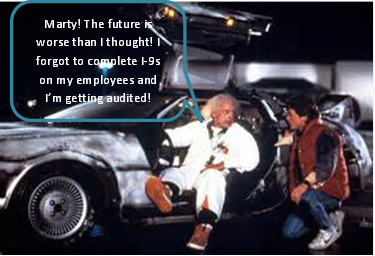I-9 Compliance: Implications of failure to complete as well as backdating Form I-9s addressed in recent OCAHO ruling

In United States v. Jalisco’s Bar and Grill, OCAHO provided further clarification on the standard for “constructive knowledge” as it applies to the prohibition of employers to “knowingly employ unauthorized workers” when it determined that failure to prepare an I-9 was “suggestive, but insufficient in itself to support a finding a constructive knowledge.” However, should an employer try to rectify a situation where no original Form I-9 can be found, or the Form I-9 was not taken timely, OCAHO and ICE’s reaction to this case underscores employers should never backdate forms to make it appear timely when it otherwise was not, as this may be interpreted as “evidence of intentional deception”..
In this case, ICE investigators found that an unauthorized worker actually disclosed to the business owner, prior to being hired, that he was ineligible to work. OCAHO agreed that this was inarguably evidence of knowledge that this worker was unauthorized to work. The unauthorized worker’s brother also worked for the same employer, but, made no such admission to his employer, nor was there any evidence that the brother, who had disclosed his status, had mentioned anything about the eligibility status of anyone but himself. OCAHO pointed out that there are often families of “mixed status” and therefore the ineligibility of one family member to work, does not infer the status of other family members.
However, during their investigation ICE also found that the employer was unable to produce any original I-9s completed timely (within three business days of any of their employees’ date of hire.) Instead the employer provided I-9s that, based on the date of the form version, and the dates on the form, were clearly backdated. The employer claimed that the original forms had been destroyed in a flood, but provided no other evidence (affidavits from employees or managers who had completed the forms timely, for example) to support this assertion. When completing new forms on their employees, the employer explained the backdating as a lack of clear instruction on how to manage such situations in the “Handbook for Employers”.
Ultimately OCAHO agreed that the Jalisco’s Bar and Grill had knowingly employed an unauthorized worker for the first brother who openly admitted his ineligibility to work, but determined that the failure to prepare an I-9 on the other brother was only “suggestive” but not sufficient in and of itself to constitute constructive knowledge. OCAHO did agree that there was no evidence that Jalisco’s Bar and Grill had prepared any timely I-9s on their employees, however, while ICE sought penalties close to the maximum for the each of the “paperwork violations” from the missing and/or backdated I-9s, OCAHO tempered these fines due to the size of the employer and the absence of any previous violations.
What lessons can employers learn from this decision?
- Always prepare timely I-9s on your employees (Employee must complete Section 1 on or before date of hire, Employer must complete Section two within three days of hire)
- Never assume that the eligibility status of one family member impacts the status of other family members. Often employers are told “rumors” by other employees; however a timely, correct and complete Form I-9 on your employees is the employer’s good faith defense that they did not knowingly hire an unauthorized worker. Requiring an employee, who has already satisfied the requirements of the Form I-9 to produce additional documentation simply based on hearsay could be a discriminatory and put an employer at much greater risk.
- When mistakes happen, be honest about them. You cannot go back in time. If you have to take an I-9 on an existing employee to replace or create a missing record, never back-date it.
- Incorrect “corrections” can cause more problems than they solve. It will mitigate your risks and save you more in the long run to consult an attorney for assistance when resolving Form I-9 and E-Verify issues.
